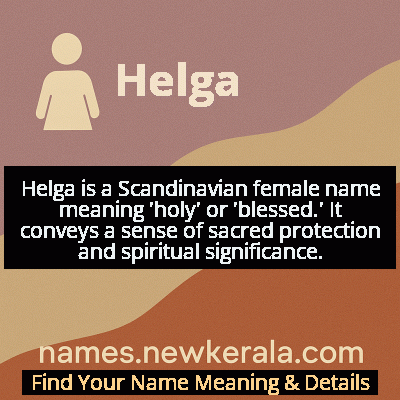Helga Name Meaning & Details
Origin, Popularity, Numerology Analysis & Name Meaning of Helga
Discover the origin, meaning, and cultural significance of the name HELGA. Delve into its historical roots and explore the lasting impact it has had on communities and traditions.
Name
Helga
Gender
Female
Origin
Scandinavian
Lucky Number
6
Meaning of the Name - Helga
Helga is a Scandinavian female name meaning 'holy' or 'blessed.' It conveys a sense of sacred protection and spiritual significance.
Helga - Complete Numerology Analysis
Your Numerology Number
Based on Pythagorean Numerology System
Ruling Planet
Venus
Positive Nature
Harmonious, responsible, caring, and artistic.
Negative Traits
Overly idealistic, superficial, possessive, or jealous.
Lucky Colours
Pink, turquoise.
Lucky Days
Friday.
Lucky Stones
Diamond, turquoise.
Harmony Numbers
2, 3, 9.
Best Suited Professions
Artists, musicians, teachers, healthcare workers.
What People Like About You
Warmth, nurturing nature, artistic flair.
Famous People Named Helga
Helga Hufflepuff
Founder of Hogwarts
Co-founded Hogwarts School of Witchcraft and Wizardry and established Hufflepuff house values
Helga Pedersen
Politician
Norwegian Minister of Fisheries and first female leader of Labour Youth League
Helga Testorf
Artist's Muse
Subject of Andrew Wyeth's famous 'Helga Pictures' portrait series
Helga Einride
Viking Chieftain
Legendary Swedish Viking leader from Norse sagas
Name Variations & International Equivalents
Click on blue names to explore their detailed meanings. Gray names with will be available soon.
Cultural & Historical Significance
Throughout the Christianization of Scandinavia, Helga maintained its popularity by adapting to Christian contexts, where it came to represent blessedness and divine favor rather than pagan holiness. The name's endurance across centuries reflects its ability to embody core Scandinavian values of resilience, integrity, and spiritual depth. In modern times, Helga has become symbolic of traditional Scandinavian identity, often appearing in literature and media as a representation of strong, grounded feminine characters who bridge ancient wisdom with contemporary life.
Extended Personality Analysis
Women named Helga are typically perceived as strong-willed, dependable, and deeply principled individuals. They often exhibit a quiet confidence and inner strength that others find reassuring and inspiring. Helgas tend to be practical problem-solvers who approach challenges with methodical determination rather than impulsive reactions. Their steadfast nature makes them excellent leaders and trusted confidantes, though they may sometimes be perceived as reserved or overly serious by those who don't know them well.
Beneath their composed exterior often lies a warm, loyal heart and strong protective instincts toward loved ones. Helgas typically value tradition and stability, preferring established routines over constant change, yet they possess the resilience to adapt when necessary. Their combination of practical wisdom and emotional depth makes them particularly effective in caregiving roles, education, and community leadership positions where their innate sense of responsibility shines. While they may not seek the spotlight, their consistent reliability and moral compass often position them as pillars of their families and communities.
Modern Usage & Popularity
In contemporary naming practices, Helga has experienced a complex trajectory. While it reached peak popularity in Scandinavian countries during the early 20th century, it declined significantly from the 1960s through the 1990s, often being perceived as old-fashioned. However, recent years have seen a modest revival as part of the vintage name trend, particularly in Sweden and Norway where traditional names are being rediscovered by new generations. The name remains relatively uncommon in English-speaking countries, where it sometimes carries stereotypical associations with strong, sometimes stern characters from media portrayals. Current usage trends show Helga being chosen by parents seeking a name with historical depth, cultural authenticity, and a sense of strength and tradition that stands out in an era of more common names.
Symbolic & Spiritual Meanings
Symbolically, Helga represents the sacred feminine principle combined with earthly strength and resilience. The name embodies the concept of 'holy ground' - suggesting a person who provides stability, sanctuary, and moral foundation to those around them. Like an ancient standing stone or ancestral hearth, Helga symbolizes enduring values, protection, and the continuity of tradition across generations. Metaphorically, the name suggests a bridge between the spiritual and practical realms - someone who can manifest higher principles in everyday life while maintaining steadfast integrity. The symbolic meaning extends to concepts of wholeness and completeness, as the original Norse root relates to being 'whole' or 'unharmed,' representing the strength that comes from authenticity and the power of staying true to one's core values.

